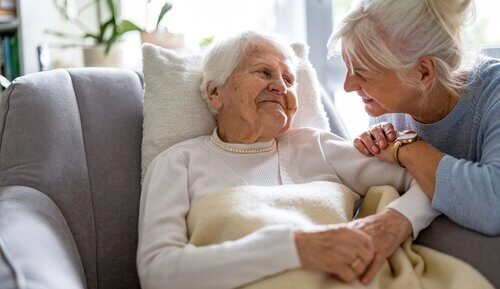To help you find the right type of care home for you, this guide sums up residential care homes, nursing homes and more. It also lists the largest care home providers and other care options available.

Page contents
- What does a care home do?
- Types of care homes
- What is a residential care home?
- What is a nursing home?
- What is the difference between a residential care home and nursing home?
- Who are the largest care home providers in the UK?
- 10 largest care home providers in the UK
- 1. HC-One
- 2. Barchester Healthcare Ltd
- 3. Care UK
- 4. Anchor
- 5. Bupa Care Homes
- 6. Avery Healthcare Group
- 7. Sanctuary Care
- 8. Maria Mallaband Care Group
- 9. MHA
- 10. The Orders of St John Care Trust
- Do local authorities run care homes?
- Other care options
- What is extra care housing?
- What is a retirement village?
- What is an adult day care centre?
- What is a mental health hospital?
- What is a hospice?
- What is home care?
Page contents
- What does a care home do?
- Types of care homes
- What is a residential care home?
- What is a nursing home?
- What is the difference between a residential care home and nursing home?
- Who are the largest care home providers in the UK?
- 10 largest care home providers in the UK
- 1. HC-One
- 2. Barchester Healthcare Ltd
- 3. Care UK
- 4. Anchor
- 5. Bupa Care Homes
- 6. Avery Healthcare Group
- 7. Sanctuary Care
- 8. Maria Mallaband Care Group
- 9. MHA
- 10. The Orders of St John Care Trust
- Do local authorities run care homes?
- Other care options
- What is extra care housing?
- What is a retirement village?
- What is an adult day care centre?
- What is a mental health hospital?
- What is a hospice?
- What is home care?
What does a care home do?
A care home provides accommodation, care and support for those who need help with managing daily life. Depending on your individual needs, this can include personal care such as help with dressing, washing and eating.
Most care homes will offer various social activities and events and enable residents to keep busy with hobbies. Trips out are also common, such as visits to local shops, garden centres and places of worship.
There are two main types of care homes, residential care which make up 70%, with nursing homes accounting for 30%, according to data from carehome.co.uk.
Care home standards in England are upheld by the Care Quality Commission (CQC). Scotland’s care regulator is the Care Inspectorate, Wales has the Care Inspectorate (CIW). Northern Ireland’s care homes are regulated by the Regulation and Quality Improvement Authority (RQIA).
A care regulator can enforce fines or even close a care home, if it believes people’s basic rights or safety is at risk. You can read more here about who inspects care homes.
Types of care homes
Video: an overview and definitions of what the different types of care homes do
What is a residential care home?
Residential care homes can offer emergency, respite, short term, long-term care and even palliative care to older people and young adults.
There are 11,391 residential care homes in the UK, with 265,741 registered beds, according to data from carehome.co.uk.
Residential care homes support older people and those aged 18-65 with physical disabilities, learning disabilities, mental health issues, alcohol/drug dependence or other care needs.
- These homes are designed for people who do not need 24-hour nursing care but are unable to care for their daily needs and so cannot live independently.
- The size of a care home can vary, with smaller homes housing as few as one resident. Larger care homes can accommodate as many as 250 residents.
- Staff at care homes can also provide assistance with daily activities such as personal care, dressing and eating.
- Residential care homes are not considered to be medical facilities.
- Care homes can give residents a furnished or unfurnished room, meals, housekeeping and laundry services. Individuals can have access to on-site facilities such as hair salons and gardens as well as opportunities to use services in the local community.
- Residents can expect to have regular social activities organised for them and day trips out into the community.
- Regular visits from entertainers, reminiscence experts, GPs, dentists, physiotherapists and other providers can be arranged.
- Specialist care facilities can be offered to support those with conditions such as dementia, alcohol dependence etc.
- For young people, help with life skills such as cooking, shopping, budgeting, training and employment can promote their independence.
You can search for Residential Care Homes and find out about care home costs.
What is a nursing home?
If you require continual support for specific conditions or types of disability, a nursing home may be the solution for you.
There are 5,065 nursing homes in the UK, with 264,903 registered beds, according to data from carehome.co.uk.
Nursing homes offer residential care as well as 24-hour medical care from a qualified nurse.
- Nursing homes are a place of residence for people who have significant difficulty coping with daily living. Therefore they are supported in the setting by nursing aides and skilled nurses who are available 24 hours a day.
- Nursing care might, for example, suit people who need intensive rehabilitative care. This could be those who have suffered a stroke, people with physical disabilities or individuals with other long-term conditions.
- Specialist care facilities can be provided to support those with conditions such as dementia, alcohol dependence etc. For the terminally ill, palliative care can also be administered in a nursing home.
- Residents can expect to have regular social activities organised for them. Regular visits from entertainers, GPs, dentists, physiotherapists and other providers can also be arranged.
You can also read about NHS-funded nursing care (FNC): Eligibility and rates .
What is the difference between a residential care home and nursing home?
The main difference between a residential care home and a nursing home is that a nursing home will always have a qualified nurse on site.
This means nursing homes can offer a higher level of care, for example for people with a physical disability who struggle significantly with daily life.
You can read more here about the difference between a care home and a nursing home.
Who are the largest care home providers in the UK?
If you want to know who the UK’s biggest operators of care homes are, check out the 10 largest list below (sourced from carehome.co.uk 13 October 2025).
10 largest care home providers in the UK
1. HC-One
HC-One is the biggest care home operator in the UK. The private operator runs 279 care homes.
It operates care homes for elderly people throughout the UK.
2. Barchester Healthcare Ltd
Barchester Healthcare Ltd is a private group operating 257 care homes.
The Barchester group cares for over 10,000 people at more than 200 different locations.
3. Care UK
Care UK is a private organisation operating 178 care homes.
It has 10,500+ employees providing residential and nursing care, specialist dementia care, respite care and compassionate end-of-life care. It cares for some 7,000 people.
4. Anchor
Anchor is a voluntary operator running 121 care homes.
Anchor is England’s largest not-for-profit provider of housing and care for people aged 55+. It has residential and dementia care homes across the country.
5. Bupa Care Homes
Bupa Care Homes is a private provider running 113 care homes.
Bupa operates residential and nursing homes, for frail elderly people or those with dementia related illnesses.
Some of its care homes also offer care for other specialisms such as Parkinson’s or Huntington’s disease, and for young physically disabled people.
6. Avery Healthcare Group
Avery Healthcare Group is a private operator of 104 care homes.
Its care homes provide care and support for older people and people with disabilities.
7. Sanctuary Care
Sanctuary Care is a voluntary organisation running 95 care homes.
It provides residential, dementia and nursing care. Part of the Sanctuary Group charity, Sanctuary Care has homes across England and Scotland.
8. Maria Mallaband Care Group
Maria Mallaband Care Group is a private organisation operating 78 care homes.
It is one of the UK’s leading care home operators and providers of retirement apartments and bungalows.
9. MHA
MHA is a voluntary provider which runs 74 care homes.
It has 77 specialist care homes and 65 retirement living schemes.
10. The Orders of St John Care Trust
The Orders of St John Care Trust is a voluntary group with 72 care homes.
It has over 3,500 residents in its care and more than 4,800 employees.
OSJCT delivers a varied range of care services, including residential, nursing and specialist dementia care.
It also offers a domiciliary care service in extra care housing schemes.
Do local authorities run care homes?
Local authorities do operate care homes but privately owned care homes are more common. Charity and voluntary organisations also own care homes.
Other care options
As you can see, above we have highlighted the two main types of care homes but other care options also exist.
What is extra care housing?
Extra care housing offers individuals more independence than living in a care home because they can live in a self-contained flat while getting meals provided.
There are 1,574 extra care housing schemes in the UK, according to data from carehome.co.uk.
People using extra care housing (also known as sheltered housing/assisted living/supported living), can also receive personal care, where required.
- This accommodation is easy to manage, ranging from a simple bedsit to a large flat or small house.
- Extra care housing schemes may have a scheme manager (previously called wardens) who live either on or offsite.
- There should be 24-hour emergency help via an alarm system to support each individual’s independence as well as care and support.
- Extra care housing schemes can provide a greater level of access and mobility for frail, older people with a domiciliary care service and personal care element being available.
- Accommodation is self-contained but there are often communal areas such as a lounge, communal dining room and garden to socialise in.
- Many schemes also run social activities for residents.
- While some housing is available to rent privately, most sheltered housing for rent is provided by councils or housing associations. They allocate housing based on need and there is often a waiting list.
What is a retirement village?
At a retirement village, you pay for care and support services. These services are on-site, as and when you need them. Retirement villages have various types of housing with some even including a care home on one site.
- Residents usually buy an apartment on the site, although in some schemes they can part-buy or even rent the property.
- Residents can decorate it how they wish and most retirement villages allow pets.
- The properties are designed to keep people living independently. It can be kitted out with alarms, fall sensors and easily-accessible showers.
What is an adult day care centre?
Adult day care centres support older people or adults with physical or cognitive impairments, such as dementia, who cannot stay at home alone safely. With support and care they can socialise and enjoy life.
There are currently 836 day care centres in the UK, according to data from carehome.co.uk. Adult day care centres are funded by local authorities, the NHS and private providers.
In the last five years, the number of day centres in the UK have dropped by 11%, from 935 in October 2020 to 836 in October 2025.
There are many benefits to day centres. These include:
- Qualified, experienced staff run day centres creating a safe space/.
- Provide gentle exercise and help with mobility.
- Provide social activities such as games, outings and entertainment.
- Carers get a break from their caring responsibilities.
- Some day centres offer training or work projects for people with disabilities.
- Others help those recovering from illness, e.g. a stroke.
- They usually provide light refreshments such as tea and biscuits or a cooked lunch.
- Help people gain the practical skills needed for independent living, such as cooking and laundry.
- Give advice on a range of subjects including opportunities to try out equipment to help with daily living tasks.
What is a mental health hospital?
Mental health hospitals can support a wide range of behavioural and mental health complications. A trained and experienced team of staff support adults who have complex needs, challenging behaviour, substance misuse etc.
- Private mental health hospitals may offer patients their own bedroom with an en-suite bathroom. Other facilities can include a dining room, shared lounges, a visitor’s room, garden and even a patient’s kitchen.
- The focus can be on rehabilitation to enable adults to become more confident and capable concerning their life skills. This allows individuals to take steps towards greater independence.
- Expert and therapeutic interventions can rehabilitate individuals with a history of offending behaviour.
What is a hospice?
Hospices aim to give the best care possible to people with terminal or life-limiting conditions. For people with a terminal illness or condition, hospices are equipped to offer end-of-life medical care. To be considered for hospice care, one has to be terminally ill or expected to die in six months.
- Hospices are also increasingly supporting people with multiple life-limiting conditions including dementia.
- Hospice care can be administered in a range of settings including a nursing home, hospice building or sometimes a hospital, however, it is most commonly practised in the home.
- Hospices care for people with a wide range of conditions including cancer, motor neurone disease, cardiovascular diseases, multiple sclerosis and Parkinson’s disease.
- Staff offer emotional and practical support to patients and their loved ones. They focus on delivering a palliative approach; with individuals made comfortable and given pain relief when needed. Staff have an important role in supporting people’s families, especially in providing bereavement support.
- Hospices can also offer a range of services for people visiting, including counselling and complementary therapies.
What is home care?
Home care (also known as domiciliary care or care at home) is for people who need help with daily living but wish to remain in their own homes rather than move into a care home or hospital.
Home care can include services such as:
- Personal care (help with washing, going to the toilet, incontinence care, dressing).
- House hold tasks such as cooking, shopping, cleaning.
- Companionship.
- Assistance to go to out to medical appointments, day care centre, social activities etc.
- Depending on your individual needs, the same care worker or home care provider may provide long-term 24-hour care, emergency care or respite care (for short breaks for an unpaid family carer).
- Some people are eligible to receive help from the NHS. This help may be a nursing service for people who are ill or recovering at home after leaving hospital.
- If you think you require help in your home, contact your local authority’s social services department to ask for a care needs assessment.


